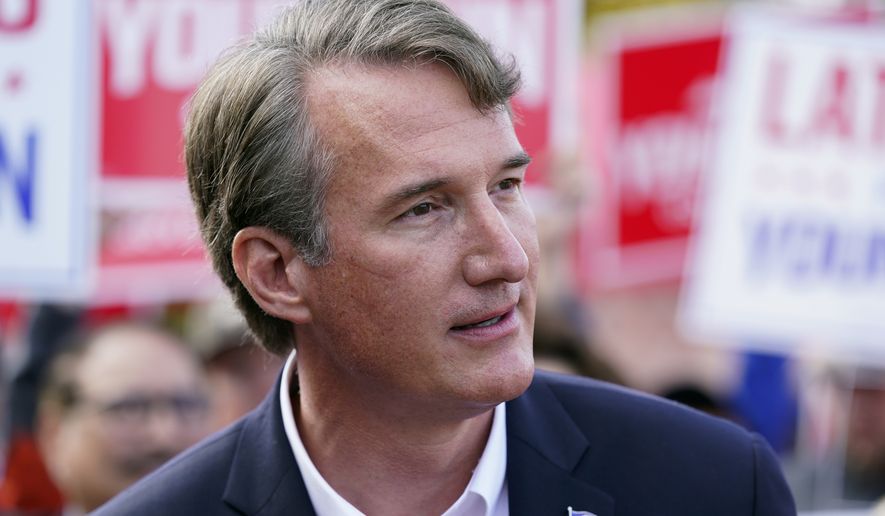OPINION:
Veterans travel on trust. While serving the nation, trust is central to what soldiers do in combat. If their leaders aren’t trusted, the dangers of battle are magnified. That’s why when veterans consider candidates for public office, the critical question is, “can I trust them to be what they say they are and do what they say they will?”
Having spent a career in the military, I know leaders must handle trustworthiness with their soldiers as they would handle a priceless glass ball. Drop it, and the trust relationship shatters. We’ve seen that with President Joe Biden, who has destroyed his trust among veterans by surrendering to the Taliban while also undermining the veterans’ choice program that allows veterans to access medical treatment quickly.
In Virginia this year, trust is on the ballot. Republican Glenn Youngkin is running against career politician and former Democrat governor Terry McAuliffe. There’s a stark contrast between these two candidates when it comes to earning the trust of veterans.
Mr. McAuliffe—who trusts and fawns over Mr. Biden—dabbled in veterans’ issues when governor. He famously declared that he would “end veterans’ homelessness in Virginia.” One need only visit a homeless camp off a highway in the Commonwealth today to know that was an empty promise. In reality, when it came to veterans’ issues, the Republican-controlled General Assembly advanced those causes, including veteran access to the job market in Virginia, new health care facilities and service centers, and property tax relief for those who were 100 percent disabled. Terry McAuliffe was along for the ride, but Republicans were in the driver’s seat.
Things will be very different when Glenn Youngkin is elected governor next month. On day one, he will be at the point of attack to improve life for Virginia veterans. He doesn’t issue empty promises. Nor will he sit back and let others take the lead. He will have a prominent seat at the table directing, inspiring, and advancing veterans’ issues in Virginia. In other words, he will lead.
Glenn Youngkin knows veterans and their issues. He’s well aware that there are an estimated 721,894 veterans in Virginia. That’s second in the nation, with 1 in 12 Virginians having served in the military. He also knows that veterans bring Virginia $12.41 billion in federal funding through compensation, construction outlays educational and vocational rehabilitation employment expenditures, medical payments, and military retirement pay.
Yet currently, only 157,914 veterans select Virginia as their permanent home. Many are looking to other states that have policies that attract veterans. Glenn Youngkin will correct that by accomplishing what others have not. He will provide tax relief on military retirement pay; build a first-in-class digital hub to connect veterans to their earned benefits and resources; and streamline placement into high need occupations like teaching, law enforcement, and health care.
Consider his “Day One” plan for Virginia Veterans. He is committed to eliminating taxes on military retirement pay starting now.
Moreover, he will waive administrative fees for permits and applications for small business start-ups for qualifying veterans to reduce barriers to entrepreneurship and allow more to enter the marketplace. Recognizing the unique barriers to entering the workforce, he will expand the existing Child Care Subsidy Program to allow active-duty primary caregivers to apply for the program before separation, so there is no gap in childcare coverage in the first 90 days after their transition.
Mr. Youngkin also knows that having access to Veterans Service Officers (VSO) is essential to advise veterans on available benefits and assist them in completing and filing benefit claims expeditiously. Amazingly, there are over 100 current vacancies in the Virginia Department of Veterans Services. That’s inexcusable. Virginia has only 75 VSOs today compared to North Carolina’s 210, with a smaller veteran population than Virginia! He will double the number of Virginia’s VSOs.
Finally, Glenn Youngkin will bring his experience to assist veterans in transitioning to good-paying, skilled jobs, including equivalence training for military police, medics, nurses, and corpsmen beyond the current program. And he will foster private-public partnerships with organizations that prioritize and provide peer and mentorship-related programs for transitioning veterans.
That’s a key point about why Glenn Youngkin should be elected as our governor. He is a successful businessman who exemplifies the traits of veterans: integrity, strong values, and leadership. For him, character matters. Veterans matter. And making Virginia the number one state for veterans is more than a slogan: it matters to Glenn Youngkin personally.
General Omar Bradley of WW II fame was known as a soldiers’ soldier. He once said, “Character is sort of an all-inclusive thing. If a man has character, everyone has confidence in him. Soldiers must have confidence in their leader.” Virginia veterans can have confidence in Glenn Youngkin because he has the character to lead.
• L. Scott Lingamfelter is a retired U.S. Army Colonel and combat veteran, a former member of the Virginia House of Delegates, and author of Desert Redleg: Artillery Warfare in the Persian Gulf War (University Press of Kentucky).




Please read our comment policy before commenting.